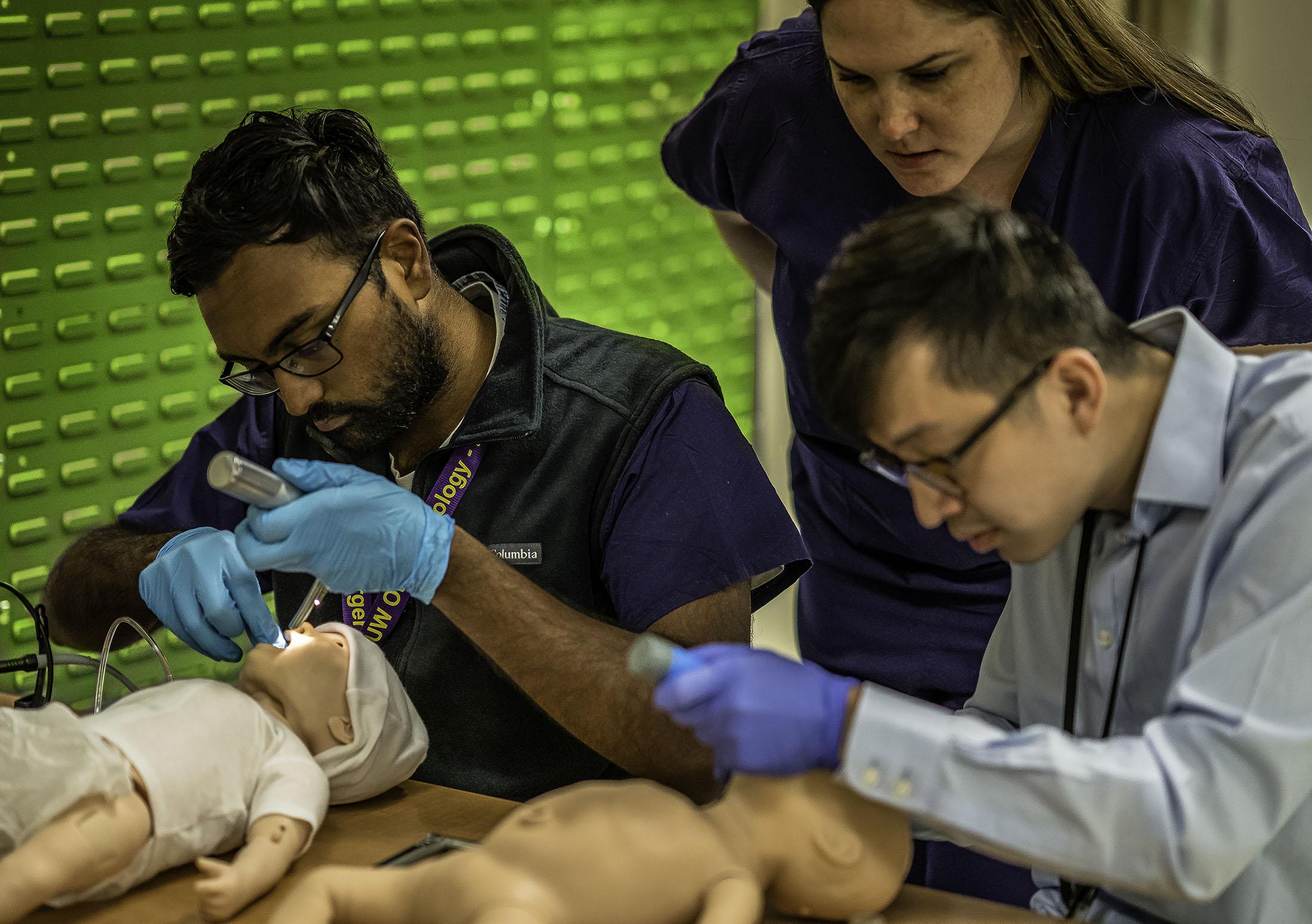What Makes an ENT Over a General Practitioner for Chronic Issues
Wiki Article
Discovering the Field of Otolaryngology: What to Anticipate When You Get In Touch With an ENT
Otolaryngology, typically referred to as ENT, includes the diagnosis and treatment of nose, ear, and throat conditions. For those experiencing related issues, getting in touch with an ENT expert can provide clarity and relief. Understanding what to expect during such appointments is important for effective interaction and treatment. This review will certainly detail essential aspects of the ENT experience, consisting of common reasons for brows through and the processes associated with medical diagnosis and therapy.
Understanding Otolaryngology: An Overview
Otolaryngology, frequently referred to as ENT (Nose, ear, and throat) medicine, is a customized branch of medicine that concentrates on the medical diagnosis and treatment of problems affecting these essential locations of the human body. This area encompasses a large range of conditions, including those pertaining to hearing, balance, breathing function, and speech. Otolaryngologists are educated to manage both clinical and surgical treatments, making use of advanced techniques and modern technologies. Their expertise prolongs past traditional ailments, resolving problems such as allergies, sinus infections, and hearing loss. In addition, they play an important function in the administration of head and neck cancers, providing comprehensive care customized to private client requirements. Overall, otolaryngology stays necessary for maintaining health and wellness and lifestyle in afflicted people.Common Factors to See an ENT Professional
Many individuals seek the experience of an ENT specialist for a variety of reasons, reflecting the varied nature of problems that impact the nose, ear, and throat. Typical problems include persistent sinus problems, which often leads to relentless nasal blockage and facial discomfort. Allergic reactions and their associated signs, such as sneezing and itching, additionally trigger check outs to these specialists (ENT surgery). Hearing loss, whether abrupt or progressive, is another considerable reason for assessment. In addition, individuals may seek analysis for throat disorders, including persistent hoarseness or swallowing problems. Sleep apnea, characterized by interrupted breathing throughout rest, is frequently dealt with by ENT professionals. Each of these problems highlights the significance of specialized care in handling complicated ENT-related health and wellness issues
Preparing for Your ENT Appointment
When preparing for an ENT consultation, it is vital to collect pertinent info and consider any type of particular concerns. People must compile a detailed clinical background, consisting of previous ear, nose, or throat problems, surgeries, and existing medications. Recording symptoms-- such as seriousness, period, and frequency-- can give beneficial understandings for the ENT specialist. Furthermore, individuals ought to prepare a checklist of concerns they desire to ask, making certain that all worries are attended to throughout the browse through. Bringing along any pertinent clinical records or test outcomes can additionally aid the ENT in recognizing the client's problem. Individuals need to verify their visit information, consisting of time, date, and place, to decrease any type of last-minute complication. Appropriate prep work can improve the effectiveness of the consultation and lead to better results.What to Expect During the Examination
As the appointment starts, the client can expect to engage in a thorough discussion with the ENT professional about their signs and symptoms and case history. The specialist will certainly ask about the duration, regularity, and seriousness of signs such as hearing loss, nasal blockage, or sore throat. Additionally, the client's previous medical conditions, medications, and any type of appropriate family members background will be reviewed, aiding the professional in creating a total understanding of the person's health and wellness. The ENT may also inquire about way of life elements, such as exposure to allergens or toxic irritants. This open dialogue establishes a structure for the examination, guaranteeing that the client's problems are addressed and establishing the stage for any kind of essential assessments or suggestions for treatment.
Diagnostic Tests and Procedures in Otolaryngology
An array of diagnostic tests and treatments are crucial in otolaryngology to accurately evaluate and diagnose conditions impacting the throat, ear, and nose. Typical examinations consist of audiometry, which determines hearing function, and tympanometry, analyzing center ear pressure. Nasal endoscopy allows visualization of the nasal passages and sinuses, while laryngoscopy takes a look at the throat and singing cords. Imaging techniques, such as CT scans and MRIs, give detailed sights of head and neck structures. Allergic reaction screening may additionally be performed to recognize triggers for sinus or respiratory system issues. These analysis devices allow ENT professionals to develop a thorough understanding of individuals' conditions, making sure tailored and effective monitoring plans. Proper diagnosis is vital for successful therapy results in otolaryngology.Therapy Options Used by ENT Specialists
ENT specialists use a selection of therapy options tailored to resolve certain problems affecting the throat, nose, and ear. These treatments range from conventional techniques, such as drug and way of life modifications, to more intrusive treatments. Allergic reactions may be managed with antihistamines or immunotherapy, while chronic sinusitis might require nasal corticosteroids or sinus surgery. For hearing loss, ENT professionals typically suggest listening device or surgical treatments like cochlear implants. In cases of throat disorders, alternatives can include speech therapy or medical treatments to eliminate obstructions. Additionally, they may provide assistance for handling sleep apnea, including making use of CPAP devices or medical treatments. On the company website whole, the goal is to improve clients' high quality of life through customized care and effective therapy methods.When to Look For Follow-Up Care With an ENT
When to look for follow-up care with an ENT professional is vital for managing recurring signs or complications associated to throat, nose, and ear problems, recognizing. Individuals should take into consideration arranging a follow-up consultation if signs persist in spite of first therapy, such as persistent ear discomfort, nasal congestion, or throat pain. Modifications in hearing, equilibrium problems, or unusual nasal discharge may additionally require further analysis. Additionally, if a person experiences adverse effects from recommended drugs or has undergone a procedure, follow-up treatment is very important to monitor recuperation and address any type of problems. Prompt assessments can assure reliable monitoring of conditions, stop possible complications, and give peace of mind pertaining to one's health. Seeking follow-up care promotes positive health and wellness management in otolaryngology.Frequently Asked Inquiries

What Credentials Should I Try to find in an ENT Professional?
When looking for an ENT specialist, one need to look for board certification, pertinent experience, and strong patient testimonials. Additionally, efficient communication abilities and a thoughtful technique can significantly boost the general treatment experience.Just how Do I Choose the Right ENT for My Demands?
Picking the best ENT professional involves reviewing their certifications, experience, and individual testimonials (ENT Clinic). It is necessary to ponder their interaction design and technique to treatment, guaranteeing they line up with the individual's details health and wellness requirements and preferencesAre There Any Threats Connected With ENT Procedures?
The threats associated with ENT procedures may include infection, blood loss, anesthetic issues, and prospective damages to bordering frameworks. Clients need to talk about these dangers with their doctor to understand individual issues and guarantee notified decisions.How Can I Handle Anxiousness Prior To My ENT Visit?
To take care of anxiety prior to a consultation, individuals can practice deep breathing workouts, imagine favorable outcomes, prepare concerns ahead of time, and seek support from pals or household, promoting a feeling of peace of mind and calmness.What Should I Do if I Experience Side Results From Treatment?
If negative effects from therapy happen, the person should promptly report them to their doctor. Changes to treatment or added treatments may be required to ensure security and effectiveness in handling their problem - Voice. As the examination starts, the individual can expect to involve in visit a complete discussion with the ENT professional about their symptoms and medical background. These diagnostic devices allow ENT professionals to create a comprehensive understanding of clients' conditions, making certain tailored and reliable administration strategies. ENT professionals supply a range of therapy choices tailored to address details conditions influencing the throat, nose, and ear. When looking for an ENT specialist, one need to look for board certification, pertinent experience, and solid client evaluations. Picking the right ENT specialist adenoid removal for allergies involves examining their qualifications, experience, and client testimonialsReport this wiki page